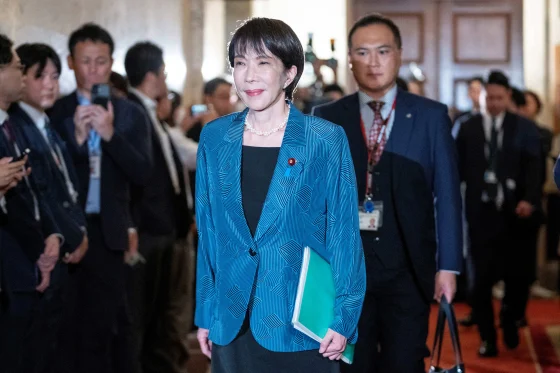Japan made history on Tuesday as Sanae Takaichi, a staunch conservative and outspoken China critic, became the country’s first female prime minister following a last-minute coalition agreement.
Takaichi, 64, who previously served as Japan’s internal affairs minister, secured the position after a surprise majority win in the first round of parliamentary voting.
The lower house endorsed her appointment, and the upper house later confirmed it after a runoff vote. She is expected to formally assume office after an audience with the emperor.
Her rise marks Japan’s fifth change of leadership in as many years.
Takaichi now faces the daunting task of leading a minority government amid political instability and ahead of a scheduled visit by U.S. President Donald Trump next week.
The former heavy metal drummer and admirer of Britain’s Margaret Thatcher became leader of the ruling Liberal Democratic Party (LDP) on October 4.
However, her path to power grew complicated after the LDP’s coalition partner, Komeito, withdrew support over a party slush fund scandal and concerns about her conservative positions.
To secure parliamentary control, Takaichi struck an 11th-hour alliance with the reformist Japan Innovation Party (JIP) on Monday. The JIP, a right-leaning group, advocates cutting the consumption tax on food to zero, banning corporate and organizational donations, and reducing the number of lawmakers.
READ ALSO: Nigeria, Japan Forge Closer Ties On Solid Minerals
Pledging to “make Japan’s economy stronger and reshape Japan as a country that can be responsible for future generations,” Takaichi promised swift reforms and a fresh start for Japan’s struggling economy.
“She’s a strong-minded person, regardless of being a woman,” said Toru Takahashi, a 76-year-old pensioner in her hometown of Nara. “She’s not like Trump, but she’s clear about what’s right and wrong.”
Takaichi has vowed to form a cabinet with what she described as “Nordic levels” of female representation — a sharp contrast to her predecessor, Shigeru Ishiba, who appointed just two women.
Possible appointments include right-wing lawmaker Satsuki Katayama as finance minister and Kimi Onoda, who has American roots, as economic security minister.
Japan ranks 118th out of 148 countries in the World Economic Forum’s 2025 Global Gender Gap Report, with women holding only about 15 percent of seats in the lower house and limited roles in corporate leadership.
While Takaichi has spoken openly about her own experience with menopause and called for greater awareness of women’s health issues, she remains opposed to allowing married couples to use separate surnames and supports maintaining the male-only succession in the imperial family.
In Nara, residents expressed cautious optimism. “I hope she’ll make Japan a more livable place for women,” said 39-year-old company worker Keiko Yoshida. Student Nina Terao, 18, added, “I’d be happy if we saw more policies from a woman’s perspective, support for childcare and help for women returning to work after having children.”





